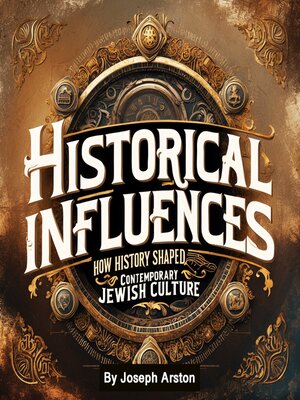Historical Influences
audiobook (Unabridged) ∣ How History Shaped Contemporary Jewish Culture
By Joseph Arston

Sign up to save your library
With an OverDrive account, you can save your favorite libraries for at-a-glance information about availability. Find out more about OverDrive accounts.
Find this title in Libby, the library reading app by OverDrive.



Search for a digital library with this title
Title found at these libraries:
| Library Name | Distance |
|---|---|
| Loading... |
Jewish culture and identity are deeply rooted in ancient history, shaped by significant events, traditions, and teachings that continue to influence contemporary Jewish life. From biblical narratives to the Second Temple period, these early foundations laid the groundwork for Jewish beliefs, customs, and communal structures.
The impact of biblical narratives is one of the most defining aspects of Jewish history. The Torah, regarded as the cornerstone of Jewish faith and law, provides a historical and spiritual framework that has guided Jewish life for millennia. Stories of the patriarchs, such as Abraham, Isaac, and Jacob, emphasize themes of faith, covenant, and resilience. The Exodus story, recounting the Israelites' liberation from Egypt, remains a central symbol of perseverance and divine intervention, shaping Jewish festivals like Passover and reinforcing the concept of Jewish unity. The laws and ethical teachings in the Torah continue to influence Jewish traditions, values, and social practices.
Jewish identity in the ancient world was shaped by interactions with surrounding civilizations. Living in lands governed by powerful empires such as Egypt, Babylon, Persia, and Rome, Jewish communities maintained their distinct religious and cultural practices while also adapting to changing political and social landscapes. The Babylonian Exile in the 6th century BCE was a turning point, as it not only led to the destruction of the First Temple but also forced Jews to develop new ways of preserving their heritage in foreign lands. This period saw the rise of synagogue worship and the emphasis on textual study, both of which remain central to Jewish life today.







